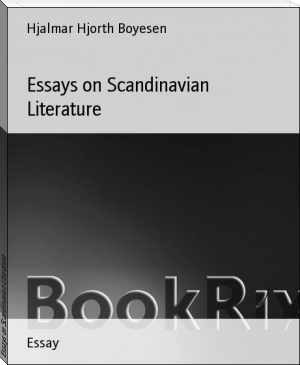Essays on Scandinavian Literature - Hjalmar Hjorth Boyesen (best books to read non fiction txt) 📗

- Author: Hjalmar Hjorth Boyesen
Book online «Essays on Scandinavian Literature - Hjalmar Hjorth Boyesen (best books to read non fiction txt) 📗». Author Hjalmar Hjorth Boyesen
ESAIAS TEGNÉR
The genius of the Scandinavian north has never found a more complete and brilliant incarnation than the Swedish poet Esaias Tegnér. Strong, cheerful, thoroughly wholesome, with a boyish delight in prowess, adventure, and daring deeds, he presents a most agreeable contrast to the moonshine singers and graveyard bards of the phosphoristic school, who were his contemporaries. To Tegnér, in his prime, life was a brisk and exhilarating sail, with a fresh breeze, over sunny waters; and he had no patience with those who described it as a painful and troublous groping through the valley of the shadow of death. There was, in other words, a certain charming juvenility in his attitude toward existence, which presented to him no riddles that a man with a strong arm and an honest heart might not solve with comparative ease. All problems were to him soluble with the sword; and Alexander, when he cut the Gordian knot, must have appeared to him wiser, as he was surely more admirable, than either Plato or Socrates. This scorn of all metaphysical subtleties, and reliance upon strength and Swedish manhood, are, perhaps (from an advanced European point of view), indicative of a little intellectual immaturity; but they are thoroughly characteristic of the Scandinavian nationalities. The love of brave words and brave deeds, the exaltation of the man of action above the man of thought, the pleasure in reckless gallantry and foolhardy adventure, are, however, not confined to Swedes and Norwegians, but are characteristic of the boyhood of every nation. In the Scotchman, Robert Louis Stevenson, this jaunty juvenility, this rich enjoyment of bloody buccaneers and profane sea-dogs, is carried to far greater lengths, and the great juvenile public of England and America, both young and old, rises up and calls him blessed.
There is, however, a vast difference between Tegnér's youthfulness and that of Stevenson. The latter (in spite of the charm of his style, which is irresistible) strikes me as a sort of mediæval survival--a boyish feudal sixteenth-century spirit astray in the nineteenth. I am by no means insensible to the fascination of his capricious confidences, his beautiful insight, and his exquisite humor; but for all that, he always leaves me with a vague regret at his whimsicality and a certain lack of robustness in his intellectual equipment. In Tegnér, on the other hand, it is primarily the man who is impressive; and the author is interesting as the revelation of the man. He has no literary airs and graces, but speaks with a splendid authority, _e plena pectore_, from the fulness of his manly conviction. He seems a very personification of the national genius--fair, vigorous, and beautiful--with the glow of health in his cheeks and the light of courage in his eye. His vision of the world is bright and vivid, and he swims with a joyous ease in the high-tide of the moment, like a beautiful fish in the luminous summer sea.
As a specimen of magnificent manhood Tegnér had few equals in his day. Tall, robust, and finely proportioned as he was, with a profile of almost classic purity, he was equally irresistible to men and women. There was a breezy, out-of-door air about him, and a genial straightforwardness and affability in his manner which took all hearts captive. His was not only the beauty of perfect health, but a certain splendid virility in his demeanor and appearance heightened the charm of his personality.
It is a matter of wonder that a man in whom the race-type had reached such perfection was but two generations removed from the soil. Tegnér's grandfathers on both sides were peasants; and his father, Esaias Lucasson, was a peasant lad who by industry and ambition had obtained an education and become a clergyman. He owed his aristocratic name to the custom, prevalent in those days, to Latinize all vulgar appellations. Esaias Lucasson, of Tegnaby (the little Småland village where he was born), became, in the Latin school, Esaias Tegnerus. He married in the course of time a clergyman's daughter, Sara Maria Seidelius, who bore him a large family of sons and daughters. The fifth son, named Esaias after his father, first saw the light of day in the parsonage of Kyrkerud, in Wermland, November 13, 1782. When he was nine years old his father died, leaving behind him poverty and sorrow. Happily a friend of the family, the Assessor Branting, took a fancy to the handsome and clever boy and offered him a home in his house. Esaias wrote a very clear, good hand, and soon got a desk and a high three-legged stool in the assessor's office. So far from rebelling against this tedious discipline, he applied himself with zeal to his task, and became, in a short time, an excellent clerk. And a clerk he might have remained if his patron had not had the wit to discover that very unusual talents slumbered in the lad. Being fond of his society, Mr. Branting got into the habit of taking him along on his official journeys; and from the back seat of his chaise Esaias made the acquaintance of the beautiful rivers, heights, and valleys of Wermland. The unconscious impressions which a boy absorbs at this period of his life are apt to play a decisive part in fashioning his future. Nature, however picturesque, never yet made a poet of a dullard; but many a time has she aroused to poetic consciousness a soul which without this stimulating influence might never have discovered its calling, might never have felt that strange, tremulous exaltation which demands utterance in song.
Esaias Tegnér stored his mind during these journeys with that wealth of imagery, drawn from the scenery of his native land, which constitutes the most national element in his verse. He also contracted, during his residence in Branting's house, an inordinate love of books. Once during the harvest-time he was placed on guard at an open gate, so as to prevent the cattle from breaking into the adjoining field. To the great chagrin of his patron, however, the cows made their way unhindered and unnoticed into the forbidden territory, while their watchman was lying on his belly in the grass, deeply absorbed in a book. Wherever he happened to be, his idea of happiness was to hide himself away with a cherished volume. Sometimes he was found sitting on the top rung of a ladder, sometimes on the roof of a turf-thatched cottage, oblivious of the world about him, plunged up to his ears in some historic or mythological tale. He was voracious, nay, omnivorous, in his reading. A book was a book to him; no matter what was its subject, whether it were poetry, history, heraldry, or horticulture, he was always likely to find something in it to interest him. But his favorite reading was the old Norse sagas, with their tremendous recitals of war and song and fabulous prowess.
It was not, however, his delight in books which made the change in his destiny. Professor C. W. Böttiger, Tegnér's son-in-law, quotes, in his life of the poet, the following incident in the latter's own words:
"One evening, as I was travelling homeward with Assessor Branting, from Carlstad to Högvalta, the stars were bright and my religious foster-father seized this opportunity to talk with me about God's omnipotence, and its visible traces throughout nature. I had just been reading Bastholm's 'Philosophy for Laymen,' and I began to give an account of what I had there learned concerning the movements of the heavenly bodies. This made an impression upon the old man, who, a few days later, informed me that he had determined to give me a scholarly education. This had long been my secret desire, though I had never dared to express it. 'You can learn nothing more with me,' he said, 'and I believe you were born for something better. If that is the case,' he added, 'do not forget to thank the Giver of all good things.'"
The boy, who was now fourteen years old, was sent to the house of a neighbor, where his elder brother, Lars Gustaf, was tutor, and was initiated by him into the classical languages. He also taught himself English by reading McPherson's "Ossian," which kept ringing in his memory for many years to come. It was during his first enthusiasm for "Ossian" that, in order to rid himself of the line "the spear of Connell is keen," he cut it into his chamber-door, where probably it is yet to be seen. At the end of fifteen months the elder brother accepted a more profitable position as tutor in the family of the great iron-manufacturer Myhrman, at Rämen, and stipulated that Esaias should be permitted to accompany him.
Very charming is the description of this hospitable, patriarchal household, in Böttiger's biography; and doubly interesting it becomes when we recognize on every page scenes and incidents which were later woven into "Frithjof's Saga." There was a large library on the estate, consisting of French, Latin, and Greek classics. With great zest Esaias attacked this storehouse of delight; and scarcely would he grant himself the needed sleep, because every hour seemed to him lost which had been robbed from his beloved authors. The instruction in Latin and Greek which his brother imparted to the young Myhrmans was to him far too slow. In his eagerness to plunge into Homer's enchanted world, he rapidly finished his grammar, and began to read ahead, book after book, so as to get the connection, even though understanding but half the words. Without knowing it, he had adopted a modern and really most excellent method of acquiring the language. For Homer became literature to him instead of a mere text for excruciating grammatical gymnastics.
It was Tegnér's good fortune that his playfellows, the seven young Myhrmans, were not so fond of Greek as he was. Often, when he was revelling in a glorious Homeric passage, these lusty barbarians would come storming into his room and carry him off bodily, compelling him to share in their sports; for Esaias was a capital hand at inventing new games, and they willingly accepted his leadership and acted upon his suggestions. Particularly his Homeric games were greatly enjoyed. They divided their troop into Greeks and Trojans and captured Troy. Esaias was always Hector, and the other boys became the raging Ajax, the swift-footed Achilles, the wily Ulysses, etc. The youngest daughter of the house, Anna Myhrman, must, I should fancy, have played somewhat more of a part in Tegnér's boyhood than his biographer allows, for the descriptions of Frithjof's and Ingeborg's childhood in Hilding's house are obviously personal reminiscences:
"No bird's nest found so high a spot
That he for her could find it not;
The eagle's nest from clouds he sundered,
And eggs and young he deftly plundered.
"However swift, there ran no brook,
But o'er it Ingeborg he took;
How sweet, when roaring torrents frighten,
To feel her soft arms round him tighten.
"The first spring flowers by sunshine fed,
The earliest strawberries turning red,
The first of autumn's golden treasure
He proffered her with eager pleasure."[26]
[26] Translation of Thomas A. E. and Martha A. L. Holcomb, Chicago, 1877. I have taken the liberty to substitute "strawberries," which is the correct translation of "Smultron," for berries.
At the age





Comments (0)